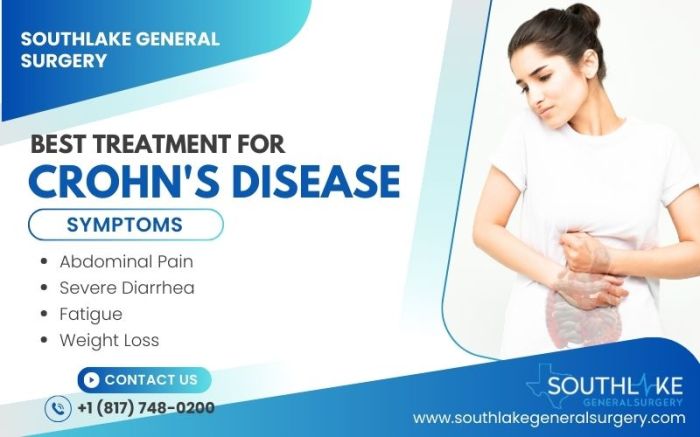
Beginning with Is There a Cure for Crohn’s Disease? Expert Insights, the narrative unfolds in a compelling and distinctive manner, drawing readers into a story that promises to be both engaging and uniquely memorable.
In this article, we will delve into the complexities of Crohn’s Disease, exploring its impact on the digestive system, common symptoms, causes, and potential treatment options.
Overview of Crohn’s Disease
Crohn’s Disease is a chronic inflammatory condition that primarily affects the digestive tract. It is a type of inflammatory bowel disease (IBD) that can cause inflammation and damage to any part of the digestive system, from the mouth to the anus.
How Crohn’s Disease Affects the Digestive System
Crohn’s Disease can impact the entire digestive system, leading to inflammation in the lining of the gastrointestinal tract. This inflammation can cause a variety of symptoms and complications, ranging from mild to severe. The inflammation can also penetrate deep into the tissues of the digestive tract, causing pain, ulcers, and other issues.
- Ulcers in the intestines
- Scarring and narrowing of the intestines
- Fistulas and abscesses
- Malabsorption of nutrients
Common Symptoms Associated with Crohn’s Disease
Crohn’s Disease can present with a wide range of symptoms, which can vary in severity and frequency from person to person. Some of the most common symptoms include:
- Abdominal pain and cramping
- Diarrhea
- Weight loss
- Fatigue
- Bloody stools
Causes and Risk Factors
Crohn’s Disease is a complex condition with multiple factors that can contribute to its development. Understanding the causes and risk factors can help individuals manage the condition effectively.
Potential Causes of Crohn’s Disease
- Genetics: There is evidence to suggest that genetics play a role in the development of Crohn’s Disease. Individuals with a family history of the condition are at a higher risk of developing it themselves.
- Immune system dysfunction: An overactive immune system can mistakenly attack healthy cells in the digestive tract, leading to inflammation and the symptoms of Crohn’s Disease.
- Environmental factors: Certain environmental factors, such as diet, stress, and smoking, have been linked to the development of Crohn’s Disease. These factors can trigger inflammation in the digestive tract and worsen the condition.
Risk Factors for Developing Crohn’s Disease
- Family history: Individuals with a family history of Crohn’s Disease are more likely to develop the condition themselves.
- Age: Crohn’s Disease is most commonly diagnosed in people between the ages of 15 and 35, although it can occur at any age.
- Smoking: Smoking has been identified as a significant risk factor for developing Crohn’s Disease and can also worsen the symptoms of the condition.
- Nonsteroidal anti-inflammatory drugs (NSAIDs): Long-term use of NSAIDs has been associated with an increased risk of developing Crohn’s Disease.
Current Treatment Options
When it comes to managing Crohn’s Disease, there are several treatment options available that aim to alleviate symptoms and improve the quality of life for patients.
Medication-Based Treatments vs Surgical Interventions
- Medication-Based Treatments: The typical approach involves using medications such as anti-inflammatory drugs, immunosuppressants, and biologics to reduce inflammation, control symptoms, and prevent flare-ups.
- Surgical Interventions: In cases where medication is not effective or complications arise, surgery may be necessary to remove damaged portions of the digestive tract, repair fistulas, or treat obstructions.
Lifestyle Changes for Alleviating Symptoms
- Dietary Modifications: Following a low-residue or low-fiber diet, avoiding trigger foods, and staying hydrated can help manage symptoms.
- Stress Management: Engaging in stress-reducing activities such as yoga, meditation, or therapy can be beneficial in reducing flare-ups.
- Regular Exercise: Maintaining an active lifestyle can help improve overall health, reduce inflammation, and alleviate symptoms of Crohn’s Disease.
Research on Potential Cures

Research efforts to find a cure for Crohn’s Disease have been ongoing for years, with scientists and medical professionals dedicated to discovering innovative treatment options. While a definitive cure has not yet been found, promising advancements in the field provide hope for improved outcomes for patients.
Promising Advancements in Crohn’s Disease Treatment
Ongoing research has led to significant advancements in the treatment of Crohn’s Disease, with the development of targeted therapies that aim to reduce inflammation and manage symptoms more effectively. Biologic medications, such as anti-TNF agents, have shown promising results in controlling disease activity and improving quality of life for patients.
Additionally, advancements in personalized medicine have allowed for more tailored treatment approaches based on individual genetic factors and disease characteristics. This precision medicine approach holds great potential for optimizing treatment outcomes and minimizing side effects.
Challenges in Developing a Definitive Cure
Despite these advancements, researchers continue to face challenges in developing a definitive cure for Crohn’s Disease. The complex nature of the disease, which involves multiple genetic and environmental factors, makes it difficult to pinpoint a single target for treatment.
Furthermore, the heterogeneity of Crohn’s Disease among patients presents a challenge in finding a one-size-fits-all cure. Variability in disease presentation and response to treatment complicates the search for a universal cure that is effective for all individuals affected by the disease.
Research efforts are ongoing to address these challenges and uncover new treatment modalities that may eventually lead to a cure for Crohn’s Disease.
Last Recap
In conclusion, while there isn’t a definitive cure for Crohn’s Disease yet, ongoing research offers hope for advancements in treatment. The journey towards finding a cure continues, with a focus on improving the quality of life for those affected by this condition.
User Queries
Can Crohn’s Disease be cured completely?
Currently, there is no known cure for Crohn’s Disease. Treatment focuses on managing symptoms and improving quality of life.
What are the common risk factors for developing Crohn’s Disease?
Risk factors include genetics, environmental factors, smoking, and certain medications.
Are there any natural remedies that can help alleviate symptoms of Crohn’s Disease?
Some people find relief from symptoms through dietary changes, stress management, and probiotics, but it’s essential to consult with a healthcare provider before trying any natural remedies.













